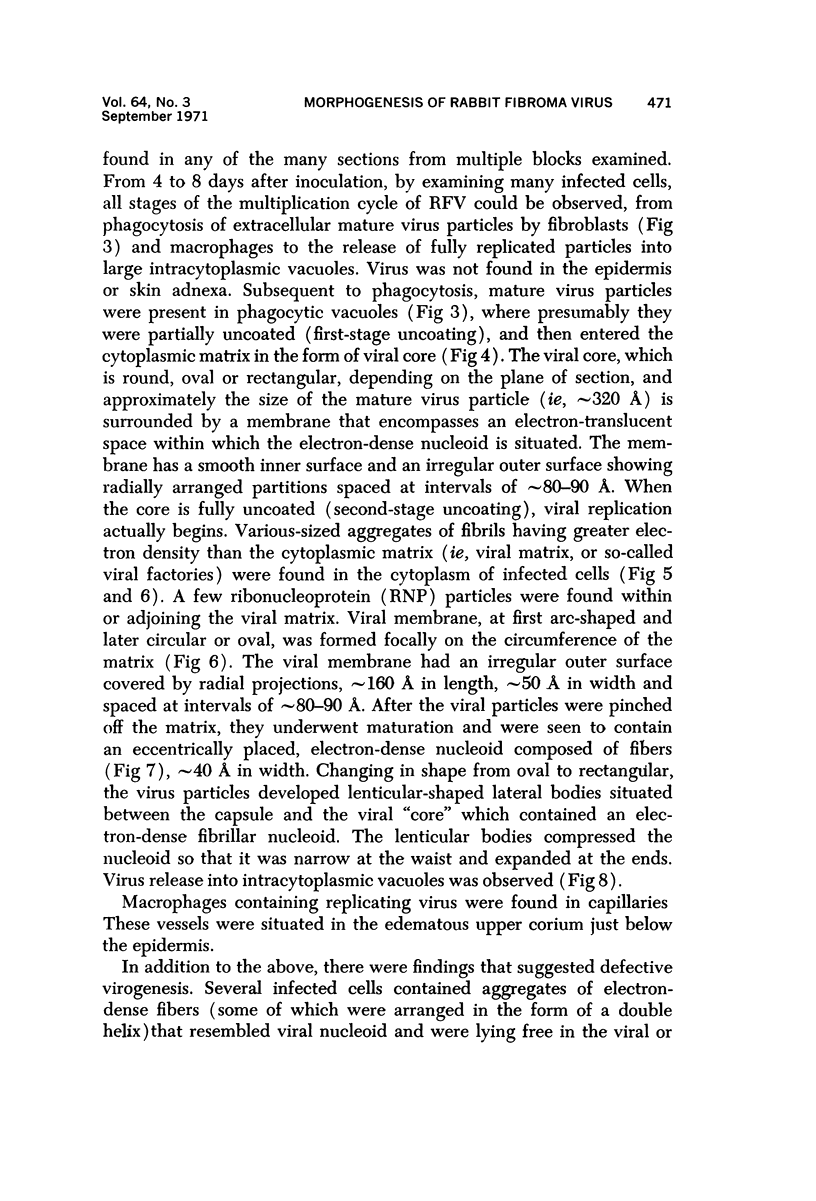Abstract
Rabbit fibroma virus injected into the dermis of adult rabbit skin evokes an inflammatory, then granulomatous and finally proliferative or tumoral response. About 1 week after injection, the grossly visible nodular lesion reaches its maximum size and regresses, becoming hemorrhagic and necrotic. Unlike vacciiia, the morphogenesis of the RFV has not been validated satisfactorily. The present study shows that RFV-infected cells contain all the evolutive forms that have been identified during the course of vaccinia virus replication. In addition, long, twisting, intracytoplasmic lamellated inclusions were found in infected cells. These lamellae were composed of linear arrays of elongated, electron-dense fibers. When the inclusion was sectioned in a plane perpendicular to the fiber, the latter was found to be covered by projections ∼160 A long, spaced at intervals of ∼80-90 A; when sectioned tangentially, the lamellae appeared to be composed of tubules. Evidence is presented showing the similarities between the subunit of the lamellated inclusion and the virus membrane. It seems likely, therefore, that the viral membrane is covered by closely packed tubules ∼160 Å long. The lambellar inclusion is thought to represent abnormal synthesis or excessive formation of viral membranes. In addition to lamellae, which probably indicate some defect in virogenesis, some infected cells contained viral membranes partially or completely encircling the host's cell constituents, or fragments of viral membrane instead of viral matrix. Furthermore, structures resembling virus nucleoid were lying free in the viral or cytoplasmic matrix. The course of viral morphogenesis was correlated with viral multiplication and the kinetics of interferon production at the site of viral inoculation in the rabbit skin.
Full text
PDF















Images in this article
Selected References
These references are in PubMed. This may not be the complete list of references from this article.
- APPLEYARD G., WESTWOOD J. C. THE GROWTH OF RABBITPOX VIRUS IN TISSUE CULTURE. J Gen Microbiol. 1964 Dec;37:391–401. doi: 10.1099/00221287-37-3-391. [DOI] [PubMed] [Google Scholar]
- BERNHARD W., HAREL J., OBERLING C. Le virus fibromateux de Shope dans des tumeurs malignes provoquées par lui; étude au microscope électronique. C R Hebd Seances Acad Sci. 1954 Sep 20;239(12):732–734. [PubMed] [Google Scholar]
- Cheville N. F. Cytopathologic changes in fowlpox (turkey origin) inclusion body formation. Am J Pathol. 1966 Oct;49(4):723–737. [PMC free article] [PubMed] [Google Scholar]
- DALES S., SIMINOVITCH L. The development of vaccinia virus in Earle's L strain cells as examined by electron microscopy. J Biophys Biochem Cytol. 1961 Aug;10:475–503. doi: 10.1083/jcb.10.4.475. [DOI] [PMC free article] [PubMed] [Google Scholar]
- De Harven E., Yohn D. S. The fine structure of the Yaba monkey tumor poxvirus. Cancer Res. 1966 May;26(5):995–1008. [PubMed] [Google Scholar]
- FEBVRE H., HAREL J., ARNOULT J. Observation, pendant la phase muette du développement intracellulaire du virus du fibrome de Shope, de corps d'inclusion diffus, sans virus corpusculaires, correspondant avec la présence d'un antigène soluble. Bull Assoc Fr Etud Cancer. 1957 Jan-Mar;44(1):92–105. [PubMed] [Google Scholar]
- HAREL J., CONSTANTIN T. Sur la malignité des tumeurs provoquées par le virus fibromateux de Shope chez le lapin nouveauné et le lapin adulte traite par des doses massives de cortisone. Bull Assoc Fr Etud Cancer. 1954;41(4):482–497. [PubMed] [Google Scholar]
- KAUFFMAN S. L., STOUT A. P. Histiocytic tumors (fibrous xanthoma and histiocytoma) in children. Cancer. 1961 May-Jun;14:469–482. doi: 10.1002/1097-0142(199005/06)14:3<469::aid-cncr2820140304>3.0.co;2-q. [DOI] [PubMed] [Google Scholar]
- LEDUC E. H., BERNHARD W. Electron microscope study of mouse liver infected by ectromelia virus. J Ultrastruct Res. 1962 Jun;6:466–488. doi: 10.1016/s0022-5320(62)80003-3. [DOI] [PubMed] [Google Scholar]
- LLOYD B. J., Jr, KAHLER H. Electron microscopy of the virus of rabbit fibroma. J Natl Cancer Inst. 1955 Feb;15(4):991–999. [PubMed] [Google Scholar]
- Scherrer R. Morphogénèse et ultrastructure du virus fibromateux de Shope. Pathol Microbiol (Basel) 1968;31(3):129–146. [PubMed] [Google Scholar]
- Vilcek J., Ng M. H., Friedman-Kien A. E., Krawciw T. Induction of interferon synthesis by synthetic double-stranded polynucleotides. J Virol. 1968 Jun;2(6):648–650. doi: 10.1128/jvi.2.6.648-650.1968. [DOI] [PMC free article] [PubMed] [Google Scholar]











